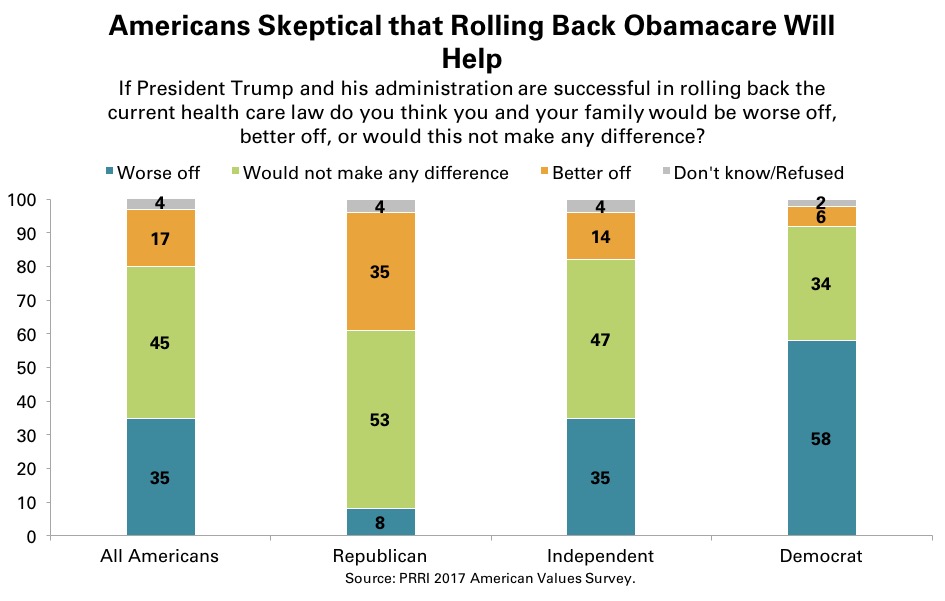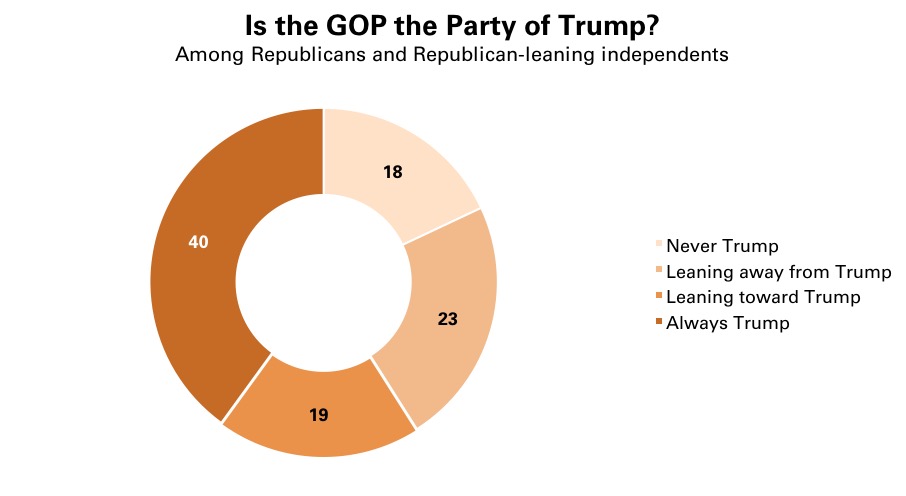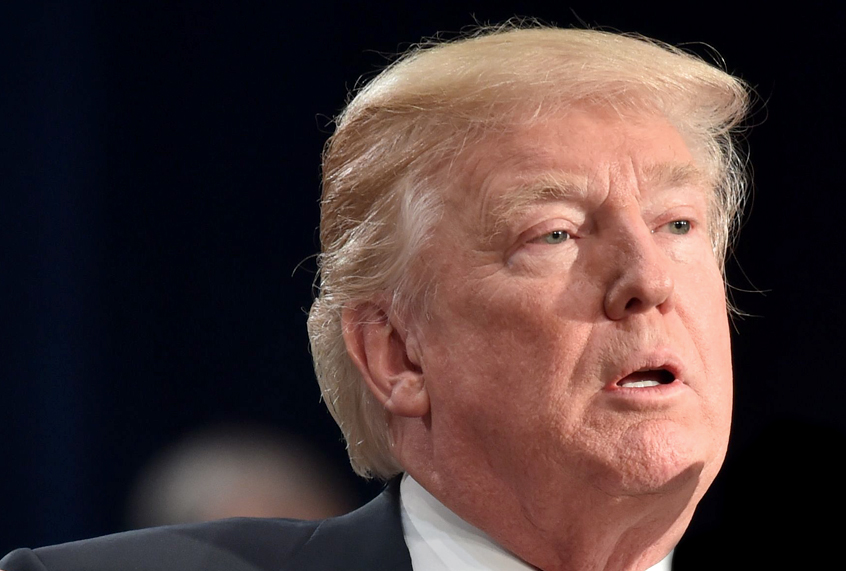More than a year and a half after Donald Trump won the Republican Party’s nomination after a divisive 2016 primary campaign, the GOP and its voters have not really come to any real agreement among themselves.
The one thing they appear to agree on the most, however, is the feeling that Democrats are bad for America.
In terms of issues, the party’s voters seem to be at odds with Republican politicians, according to an extensive survey of 2,019 adults conducted by the non-profit Public Religion Research Institute (PRRI).
Among respondents who identify as Republican or lean toward the party, just 35 percent said that they believed that rolling back the Affordable Care Act would make them better off. A majority, 61 percent, said that repeal of Obamacare would either make no difference at all or would make them worse off. Even more worrying for anti-government Republicans, a full 32 percent of their own voters told PRRI that they supported government-guaranteed health insurance, even if it meant raising taxes.

Even on the topic of immigration, 63 percent of Republican voters said that they favored granting legal resident status to the Dreamers, people brought to the United States as undocumented immigrants when they were children. GOP voters remain more supportive of Trump’s signature immigration policy of building a wall on the Mexican border, with 73 percent supporting the idea. A slightly smaller number, 66 percent, support his idea of temporarily preventing immigration from several countries, most of which have Muslim religious majorities.
Republican voters appear to be even more skeptical of the party than of Trump. Just 55 percent of GOP-leaning respondents said that they believed that the Republican Party as a whole favored policies that “move the country in the right direction.” By comparison, 67 percent said they thought Trump’s policies would do so.
While Trump appears to be more popular than the GOP at large, when it comes to his re-election prospects, it appears that he has yet to unify the party. Asked if they wanted Trump to be their party’s presidential candidate in 2020, 31 percent of Republican respondents said that they would prefer another nominee. Only 63 percent said they would want Trump to be picked again, a strikingly low number for an incumbent president.
One group that will be particularly worth watching is the 23 percent of Republicans who said they backed Trump during the primaries but did not support him now. If that group continues to grow, it could cause problems for the president in 2020.
While Trump has clearly lost support among Republicans and Republican-leaning voters, he still manages to inspire a smaller group of die-hard fans. According to the survey, 37 percent of people who said they supported the president said there was “almost nothing” that he could do to lose their support.
Interestingly enough, during last year’s presidential primaries, Trump earned only 45 percent of the vote compared to other candidates. He only started averaging over 50 percent of the vote several months into the primary contests, when it was obvious he would be the nominee. Trump has joked about his hardcore group of supporters on occasion, saying in January of last year that he could shoot someone in public and still not lose any votes.
The “Never Trump” faction of the Republican Party, which caused him some trouble last year but has been largely invisible since his electoral victory, still seems to exist. According to PRRI, 18 percent of respondents said they did not support Trump in 2016 and were not inclined to support him in 2020.

There appears to be a significant racial divide among Republicans in regards to Trump. While 76 percent of PRRI respondents who leaned or identified as Republican were white, among those who said they were inclined not to support Trump in 2020, only 59 percent were of European ancestry. This parallels racial trends that were observed during the 1964 election when Republicans ran Barry Goldwater, a candidate who made many indirect appeals to supporters of segregation. That year, the GOP managed to earn just 6 percent of the votes from nonwhites, according to Gallup’s historical data. Four years earlier, with Richard Nixon as the 1960 nominee, Republicans received 32 percent of the nonwhite vote.
Despite their many differences, however, Republican voters seem to be united in their distaste for Democrats. Just 5 percent of PRRI’s Republican respondents said that Democrats favored policies that would help America, while 90 percent said otherwise. Among “Always Trump” Republicans, 62 percent said they believed Democrats were so misguided that they represent “a serious threat to the country.” Among Republicans as a whole, 50 percent believed that Democrats threaten America. Most “Never Trump” Republicans said that Democrats were only misguided in their views, although a still-sizable number, 40 percent, said that the opposing party presents a threat to America.
(Democrats were not that far removed in their dislike for Republicans, however. In the survey, 54 percent of Democratic voters or Democrat-leaners said that Republican policies were a threat to the country, while 38 percent said they were only misguided.)
In large measure, the strong loyalty that Trump and Republican figures like Alabama U.S. Senate candidate Roy Moore have cultivate derives from the network of highly partisan media sources who attack mainstream news outlets for reporting negative information about Republicans, while hyping reports from mainstream news that reflect negatively on Democrats.
Fox News Channel host Sean Hannity and Breitbart News executive Steve Bannon provided a perfect example of this kind of conspiratorial fare when the two claimed during a Monday Breitbart radio program that Trump’s critics want to imprison right-wing media figures.
“People like us may end up in jail. Let me tell you. They will stop at nothing,” Hannity said, according to audio captured by the liberal group People for the American Way. “This is what I’m trying to get across to people. This is serious. This is the rule of law in this country now.”
“Amen, amen,” Bannon agreed. Neither bothered to mention that Trump and his team had repeatedly encouraged Republican voters to chant “lock her up” in reference to Hillary Clinton, or that Trump has threatened to prosecute Clinton for unspecified crimes.
This bunker-mentality rhetoric about the media seems to be working. In the PRRI data, 79 percent of Republican respondents said that journalists were more interested in promoting their own personal or political beliefs than in being fair and accurate.
With national Republican officials having been unable to agree on any single major piece of legislation thus far in Trump’s presidency, and with the party’s voters disagreeing among themselves, mutual distrust and dislike of Democrats appears to be the only glue holding the GOP together.
“What it means to a Republican under Trump is to be scared,” Henry Olsen, a moderate conservative who is a senior fellow at the Ethics and Public Policy Center said during a Tuesday panel discussion about the PRRI survey at the Brookings Institution in Washington.
Considering how divided Republicans are about policy and about Trump himself, Olsen said he believes Democrats can take advantage of the situation if they help make anti-Trump Republicans feel more welcome in a changing world.
“Do you want to form a new coalition, or do you want to make the same mistake that the Republicans did after 2010 and the Tea Party, by mistaking the fervor of your base for widespread agreement?” he asked of Democrats rhetorically.
Joy Reid, a liberal host at MSNBC, argued that nothing Democrats could do was likely to win over Republican voters. Referencing a survey of Trump voters that she had political science students conduct at a course she teaches part-time, Reid noted that almost none of them cited economic issues as a justification for their support. The only exception was found among self-described Democrats who said they had supported Barack Obama in 2012 but flipped to Trump in 2016.
Democrats have failed to offer real answers to people who find themselves unemployed or underemployed in today’s labor market, Reid argued.
“Democrats have been letting go of their own voters by not addressing people who want America to be an industrial power again,” she said.
Those findings correlate with a poll conducted by the left-leaning political action committee Priorities USA, which found that 77 percent of Obama-Trump voters believed that the reality show host was going to enact economic policies which favored all income groups equally or benefit the middle-class most.

